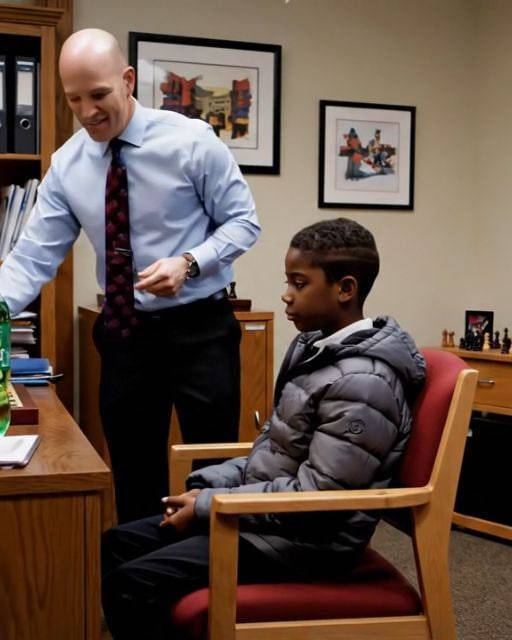The call came during second period, cutting through the usual quiet rhythm of the school day. “Can you come down?” the teacher asked, voice clipped and uncertain. “One of our students—he won’t take off his hat.”
That alone would’ve been odd; hats were banned, no exceptions. But something in the tone made me pause. This wasn’t just defiance.
In my office sat Jaden. Eighth grader. Quiet, polite, the kind of kid teachers barely notice because he never stirred trouble. Today, though, he looked folded in on himself—shoulders rounded, arms crossed tight, the brim of his cap pulled low so deep it cast his eyes in shadow. He didn’t move when I came in. He didn’t look up.
I pulled a chair across from him and kept my voice low. “What’s going on, man?”
Silence stretched. I leaned in a fraction. “You know the rule. I just need to know why you’re keeping it on today.”
Finally, in a voice so soft it might have been trying not to be heard, he said, “They laughed at me.”
“Who did?” I asked.
“Everyone,” he mumbled, lip trembling. “At lunch… they said my head looked like it got run over by a lawnmower.”
I softened further. “Can I see?”
He hesitated, hands twitching, then slowly lifted the hat—like peeling off armor. His hair was a patchwork of uneven stubble and bare spots, jagged and half-fixed by whoever had tried and given up.
I could’ve followed policy. I could’ve written him up, sent him home, enforced the rule. Instead, I stood and opened the top drawer of my desk. Before I became a principal, I’d cut hair to put myself through college. Old habits don’t vanish; I kept clippers there “just in case.”
“Tell you what,” I said, pulling them out. “Let me fix this. You’ll walk out looking sharp.”
His eyes flicked up, wary. “You… cut hair?”
“Better than whoever did this last time,” I said, trying for a grin.
A nervous chuckle escaped, and after a beat, he nodded.
As I worked, shaping and evening what he had, Jaden’s body slowly loosened. His shoulders relaxed, the tension eased, and he began to talk—about school, sports, little things. The silence around him thinned, and a small smile appeared. Then, mid-trim, I saw the faint lines on his scalp—thin, pale scars. One traced by his temple, another across the crown.
“Looks like you’ve had a rough one before,” I said casually. “Accident?”
He froze, then muttered, “My mom’s boyfriend threw a glass bottle when I was seven. Needed stitches.”
I gripped the clippers a little tighter but kept my voice calm. “Does that still happen?”
He shrugged without looking up. “Not really. He left. Now it’s just my uncle. He doesn’t… do anything.”
I finished quietly. When I handed him the mirror, his face lit—just a little.
“Looks good,” I said.
He gave a shy, small smile. “Thanks.”
That night, I pulled his file. Multiple transfers, patterns of absences lining up with unexplained injuries, counselor notes using words like “withdrawn,” “quiet,” “possible home instability.” It wasn’t a mystery anymore. It was a map of a boy surviving more than schoolyard ridicule.
The next week, I made a point to check in. Little actions—hall passes to his office, catching him at lunch, simple greetings in the hallway. He never opened up all at once; he always seemed braced, as if expecting the next blow. Then one afternoon, after the buses emptied and the building went quiet, he wandered in alone.
“You got any of that hair gel?” he asked, nodding toward the drawer.
I raised an eyebrow but passed it over. “Trying to impress someone?”
He flushed. “Nah. Just… wanna look good.”
He sat tapping the desk, quiet for a long moment. Then, almost too low to hear, he asked, “You ever been… embarrassed to go home?”
The question landed with the weight of something kept inside far too long.
I leaned back. “Yeah. I used to stay out until dark. Anywhere but home. My mom drank. Her boyfriend yelled. Threw things. I’d sleep with headphones on just to drown it out.”
Jaden nodded slowly, eyes on his hands. “Same,” he whispered.
That’s when I understood. This wasn’t about a bad haircut or a rule. It was survival.
I brought in Miss Raymond, our counselor—she had a way of being present without pressure, of making kids feel safe enough to lower their guard. Jaden started seeing her every Thursday. Weeks later, she stopped me in the hallway, eyes glossy.
“He told me about the scars,” she said softly. “What happened when he was younger. He trusts you.”
That hit me in the gut—hard, sharp, necessary.
Then came the night everything shifted. I was walking to my car after a late meeting when I saw him, alone on the curb, clutching a worn duffel. His hoodie was up, and under the streetlamp, a bruise purpled on his cheek.
“Jaden?” I called.
He jumped, like something had startled a cornered animal. “What happened, buddy?”
“Uncle got mad. Said I left milk out. Pushed me into the wall. I… I just left. Didn’t know where to go.”
“Did you call anyone?”
“No.” His eyes darted away. “Didn’t know who to call.”
I opened the car door. “Come on. You’re not in trouble. Let’s get you somewhere safe.”
Within the hour, Child Protective Services was involved. They’d already had flags from earlier reports, so things moved fast. Miss Raymond didn’t hesitate. “He can stay with me,” she said. “I’ve got room and the heart to give.”
That night he texted me from her guest room: “Thanks for not sending me back.”
I stared at the message, then replied, “You deserve safe. Always.”
He transferred schools soon after. The change was quiet at first—new routines, new teachers—but word came that he was different. Walking a little taller. Helping others with homework. Joining the track team. He kept his hair neat. He still stopped by every other Friday for a soda and a few minutes of conversation.
The moment that mattered most came at the spring assembly. Each grade voted on a “Kindness Counts” award. When they called Jaden’s name, the applause rolled through the auditorium like a wave. On stage, gripping the mic with hands that shook, he said, “I used to hide under my hat. But I don’t need to anymore.”
There wasn’t a dry eye in the place. Teachers, students, even the janitor wiped their cheeks.
Later, he told me he was being adopted by Miss Raymond. On the last day of school, he handed me a gift: a navy-blue cap trimmed in gold letters.
“Figured you could hang it in your office,” he said, grinning.
I laughed, holding it up. “You know hats aren’t allowed, right?”
He shrugged. “Yeah… but maybe one exception.”
The next morning, I hung it above my desk.
Now, every time I glance at that cap, I’m reminded: rules matter, but compassion matters more. What looks like defiance can be a silent call for help. Sometimes all it takes is one haircut, one honest conversation, one person willing to stay present long enough to listen—to pivot someone from hiding to healing.



